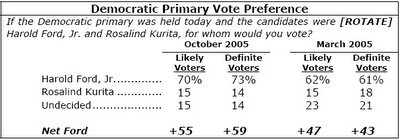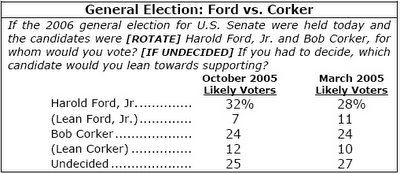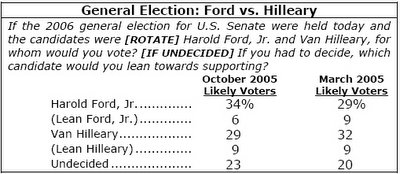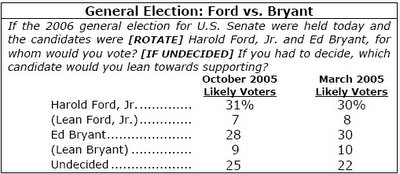 On Monday, the Ford campaign released a new poll which shows Congressman Harold Ford Jr. leading all of his opponents in U.S. Senate campaign.
On Monday, the Ford campaign released a new poll which shows Congressman Harold Ford Jr. leading all of his opponents in U.S. Senate campaign.Below is the memorandum which details the entire findings of the polling. (If you wish to view the memorandum as a .PDF file, please click here)
FROM: Harrison Hickman & Eily Hayes, Global Strategy Group, LLC
RE: Tennessee survey results
Date October 31, 2005

Primary Vote Performance
The Republican nomination remains extremely close with Ed Bryant and Van Hilleary maintaining their advantage over Bob Corker. Bryant continues to lead with 33% of likely Republican primary voters, though his margin is somewhat lower than it was in March. Hilleary is supported by 29%, while 17% say they intend to vote for Corker.
General Election Vote Performance



Harold Ford, Jr. continues to consolidate support among Democrats, and potential Republican candidates have the support of about three out of every four respondents who identify themselves as Republican. The vast majority of Independent voters are undecided in all match-ups. All evidence shows that Harold Ford, Jr. is strongly positioned to win this U.S. Senate seat.
The Political Environment
Since March, Tennessee voters’ perceptions of national-level Republicans George W. Bush and Bill Frist have shifted dramatically. Both have suffered significantly lower favorable ratings and significantly higher unfavorable ratings. In contrast, favorability ratings for all U.S. Senate candidates remain comparable to those from the March survey; Harold Ford, Jr. enjoys the highest favorability rating among them, furthering the case that he is well-positioned for the U.S. Senate contest.

Conclusion
In summary, at this early phase in the campaign, Harold Ford, Jr. is well positioned to be the next U.S. Senator from Tennessee. He has a commanding lead in a possible Democratic primary, and leads all challengers in potential general election match-ups. Further, increasing discontent with national Republicans and with the status quo should all favor Harold Ford, Jr. over any potential Republican candidate.
TECHNICAL NOTE: This memorandum summarizes results from a telephone poll of a randomly selected sample of 1500 registered voters in the state of Tennessee who say they definitely or probably will vote in the 2006 November general election. Interviewing was conducted October 13th through October 20th, 2005. The sample for the survey was selected in a manner to insure that every household in the state of Tennessee with a working telephone was equally likely to be included in the sample. Special care was taken to insure that the geographic and demographic divisions of the actual electorate are properly represented in the sample. The estimation error associated with a sample of 600 is 2.5 percent at the 95% confidence interval. This means that in 95 of 100 cases, the results of this poll are within 2.5 points, plus or minus, of the results that would have been obtained if all probable voters in the state of Tennessee had been interviewed.
Commentary: This poll just underscores what I have been saying for months now; Harold Ford Jr. is a man on the move!
While his opponents sit back and bicker back and forth, Congressman Ford is seeking real solutions to real problems.
By the results of this polling, the people of Tennessee are realizing that.

